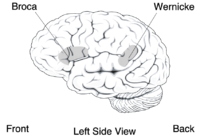
Back بوابة:لسانيات Arabic Портал:Езикознание Bulgarian Portal:Lingüística Catalan Portal:Linguistik German Portal:Lingüística Spanish Portail:Linguistique French Portál:Nyelvészet Hungarian Portale:Linguistica Italian Portal:言語学 Japanese Портал:Лингвистика Macedonian
- For a topical guide of this subject, see Outline of linguistics
Welcome to the Linguistics Portal!Linguistics is the scientific study of language. Linguistics is based on a theoretical as well as a descriptive study of language and is also interlinked with the applied fields of language studies and language learning, which entails the study of specific languages. Before the 20th century, linguistics evolved in conjunction with literary study and did not employ scientific methods. Modern-day linguistics is considered a science because it entails a comprehensive, systematic, objective, and precise analysis of all aspects of language – i.e., the cognitive, the social, the cultural, the psychological, the environmental, the biological, the literary, the grammatical, the paleographical, and the structural. Traditional areas of linguistic analysis correspond to syntax (rules governing the structure of sentences), semantics (meaning), morphology (structure of words), phonetics (speech sounds and equivalent gestures in sign languages), phonology (the abstract sound system of a particular language), and pragmatics (how social context contributes to meaning). Subdisciplines such as biolinguistics (the study of the biological variables and evolution of language) and psycholinguistics (the study of psychological factors in human language) bridge many of these divisions. Linguistics encompasses many branches and subfields that span both theoretical and practical applications. Theoretical linguistics (including traditional descriptive linguistics) is concerned with understanding the universal and fundamental nature of language and developing a general theoretical framework for describing it. Applied linguistics seeks to utilise the scientific findings of the study of language for practical purposes, such as developing methods of improving language education and literacy. Linguistic features may be studied through a variety of perspectives: synchronically (by describing the shifts in a language at a certain specific point of time) or diachronically (through the historical development of language over several periods of time), in monolinguals or in multilinguals, amongst children or amongst adults, in terms of how it is being learned or how it was acquired, as abstract objects or as cognitive structures, through written texts or through oral elicitation, and finally through mechanical data collection or through practical fieldwork. (Full article...) Selected article - Black American Sign Language is a dialect of American Sign Language (ASL) spoken most commonly by deaf African Americans in the United States. The divergence from ASL was influenced largely by the segregation of schools in the American South. Like other schools at the time, schools for the deaf were segregated based upon race, creating two language communities among deaf signers: White deaf signers at White schools and Black deaf signers at Black schools. Today, BASL is still used by signers in the South despite schools having been legally desegregated since 1954. Linguistically, BASL differs from other varieties of ASL in its phonology, syntax, and lexicon. BASL tends to have a larger signing space meaning that some signs are produced further away from the body than in other dialects. Signers of BASL also tend to prefer two-handed variants of signs while signers of ASL tend to prefer one-handed variants. Some signs are different in BASL as well, with some borrowings from African American English. (more...) Did you know...From Wikipedia's "Did You Know" archives: 
Related PortalsThings you can do
WikiProjectsThe following WikiProjects work to improve topics concerned with linguistics:
Associated WikimediaThe following Wikimedia Foundation sister projects provide more on this subject:
Discover Wikipedia using portals |
© MMXXIII Rich X Search. We shall prevail. All rights reserved. Rich X Search


























